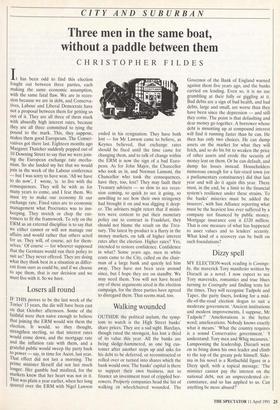Losers all round
IF THIS proves to be the last week of the Tories' 13 years, the die will have been cast on that October afternoon. Some of the faithful were then naïve enough to believe that joining the ERM would win them the election. It would, so they thought, strengthen sterling, so that interest rates would come down, and the mortgage rate and the inflation rate with them, and a grateful public would sweep the party back to power — say, in time for Ascot, last year. That effect did not last a morning. The prime minister herself did not last much longer. Her gamble had misfired, for the markets knew that her heart was not in it. That was plain a year earlier, when her long quarrel over the ERM with Nigel Lawson ended in his resignation. They have both lost — for Mr Lawson came to believe, as Keynes believed, that exchange rates should be fixed until the time came for changing them, and to talk of change within the ERM is now the sign of a bad Euro- pean. As for John Major, the Chancellor who took us in, and Norman Lamont, the Chancellor who took the consequences, have they, too, lost? They may fault their Treasury advisers — so slow to see reces- sion coming, so quick ,to see it going, so unwilling to see how their own stringency had brought it on and was digging it deep- er. The advisers might retort that if minis- ters were content to put their monetary policy out to contract in Frankfurt, they should not blame the result on the Trea- sury. The latest by-product is a flurry in the money markets, on talk of higher interest rates after the election. Higher rates? Yes, intended to restore confidence. Confidence in what? Some years ago, men in white coats came to the City, called on the chair- man of a large bank and quietly led him away. They have not been seen around since, but I hope they are on standby. We may need them. You will not have heard any of these arguments aired in the election campaign, for the three parties have agreed to disregard them. That seems mad, too.


















































 Previous page
Previous page